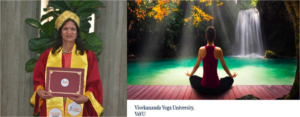In June 2022, I completed a master’s in the science of Yoga, with a specialization in Yoga Therapy, from Vivekananda Yoga University, VaYU in Los Angeles. Today I would like to share more information about this amazing journey.
This is the first yoga university outside of India focused on “graduate yoga education and research”. It is also the first yoga university in the USA. Mine was the first batch of students graduating with a master’s degree.
I thoroughly enjoyed the four-semester-long enrichment that I received from utterly knowledgeable and experienced faculty. The faculty is recruited from the US as well as from India. The program is centered on an evidence-based yoga routine and a modern scientific approach to the traditional ancient Indian practice of yoga. Thus, the faculty includes experts from different fields like modern medicine, naturopathy, ayurveda, ancient yogic scriptures, yoga philosophy, research methods, research in the field of yoga and Biomedical science, clinical yoga therapy, so on and so forth.
The program focuses on yoga therapists being able to help the clients manage different medical conditions, especially non-communicable diseases which are borne out of stress. (A medical doctor may diagnose, prescribe medications, and may refer the patient to the yoga therapist so the patient can manage the medical condition with lesser stress.)
- The first semester gives a comprehensive knowledge about the therapeutic basis of yoga as mentioned in ancient yogic texts like Bhagavadgita, Patanjali Yoga Sutras, and in other systems of Indian Medicine like Ayurveda and Naturopathy. Thus, the semester introduces us to the concept of a human entity at physical, pranic, mind, emotional and spiritual levels, and one’s ability to recognize and remove stress, maintain a balance of one’s own nature and be able to manage the impact of stress on the physical body.
- The second semester gives comprehensive medical knowledge of different diseases. It introduces respiratory disorders like asthma and respiratory infections, cardiovascular disorders like hypertension and coronary artery disease, endocrine and metabolic disorders like diabetes, hypothyroidism, hyperthyroidism, and obesity, excretory system disorders like irritable bladder and stress incontinence, gynecological disorders like PCOS and PMS, gastrointestinal disorders like peptic ulcers, IBS, and ulcerative colitis, Musculo-skeletal disorders like back pain, neck pain and arthritis, neurological disorders like migraine headaches, epilepsy, psychiatric disorders like anxiety, depression and substance abuse, diseases like cancer and kidney disease.
- The third semester focuses on yoga therapy techniques to manage the above diseases. These techniques include yoga asanas or poses to attain balance at the physical level, pranayama or breathing techniques, and certain energization techniques to attain balance at the pranic level. Then it also focuses on certain advanced meditation techniques that help one with managing chronic stress or tension and take care of destructive emotions which are the root cause of non-communicable diseases.
- The fourth semester includes working on a specialization area which can be yoga therapy or yoga philosophy or yoga research. I have been working as a certified yoga instructor for more than two decades and always had a therapeutic approach toward yoga in my teaching. Hence, I chose the yoga therapy specialization path. Here, I learned the pathophysiology of different disorders from clinicians in the related area of specialization like cancer, heart diseases, etc. I also analyzed evidence-based research studies done to support the use of yoga therapy in the management of these health conditions. I did an 8-week research study on yoga techniques useful in managing hot flashes and sleep disturbance in the menopause phase of women and submitted as well as presented a thesis. This gave me a glimpse of the Ph.D. program of the University. This semester also focused on yogic techniques to make pregnancy and post-pregnancy a healthy and joyful process. Finally, I learned how to recognize the choices of various yoga techniques for the effective management of each health condition. The program also introduces you to certain yoga modules to be used for specific health conditions. For example, for diabetic patients, there is a specific module or routine.
The best part of the program, in my opinion, is the source of these yoga modules. These modules are the creation of SVYASA, Bangalore, India, the very first yoga university in the world https://svyasa.edu.in/. This university has had its own research facility for over 30 years. With the best technology available, evidence-based research is carried out to understand the biology of yoga at multiple levels – physical levels to more subtle levels of the existence of humans. These modules have helped bring yoga into the limelight for its therapeutic values.
If anyone wants to learn authentic, original yogic science and the integrated approach of yoga therapy in conjunction with modern medical science, I will highly recommend Vivekananda Yoga University, VaYU. It is a cohort-based online program but at the end of the first and third semesters, students are expected to attend a weeklong hands-on training program at the University’s Los Angeles campus. This could not happen in my case due to Covid-19 and it was replaced by live video sessions. I am enjoying the process of putting this knowledge and wisdom to practical use while continuing to guide my students on their path of wellness and while working on clients being referred to me by medical doctors.
Anu Buzruk
847 544 6708

